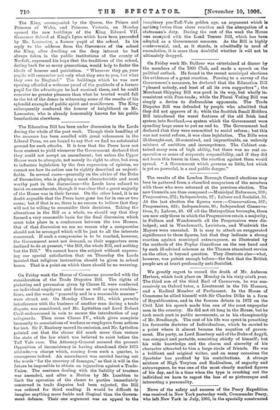On Friday week the House of Commons proceeded with the
consideration of the Trade Disputes Bill. The rights of picketing and persuasion given by Clause II. were conferred on individual employers and firms as well as upon combina- tions, and the words "peaceably and in a reasonable manner" were struck out. On Monday Clause III., which permits interference with the business of another man during a trade dispute, was considered, and Mr. Lyttelton and Lord Robert Cecil endeavoured in vain to secure the introduction of any safeguards. Then came Clause IV., which gives complete immunity to associations of workers or employers from actions for tort. Sir F. Banbury moved its omission, and Mr. Lyttelton pointed out that the clause did much more than restore the state of the law which was believed to exist before the Taff Vale case. The Attorney-General accused the present Opposition of inconsistency in having abandoned their 1875 attitude,—a charge which, coming from such a quarter, is courageous indeed. An amendment was carried leaving out the words "for the recovery of damages," so that it will in the future be impossible to obtain an injunction against a Trade- Union. The sentence dealing with the liability of trustees was amended, and after a Motion by Mr. Lambton to limit the operation of the clause to parties immediately concerned in trade disputes had been rejected, the Bill was ordered for third reading. It would be difficult to imagine anything more feeble and illogical than the Govern- ment defence. Their one argument was an appeal to the imaginary pre-Taff-Vale golden age, an argument which is nothing better than sheer reaction and the abnegation of a statesman's duty. During the rest of the week the House was ocoapied with the Land Tenure Bill, which has been adopted as a Government measure. As the Bill is highly controversial, and, as it stands, is admittedly in need of emendation, it is more than doubtful whether it will not be ultimately dropped.














































 Previous page
Previous page